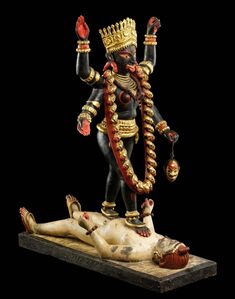Kālī Kirtan is a separate genre of a musical form of narration devoted to Godess Kālī . It should not be mixed up with Shyma Sangeet.
Kirtan, Sanskrit: कीर्तन; is a Sanskrit word that means "narrating, reciting, telling, describing" of an idea or story. It also refers to a genre of religious performance arts, connoting a musical form of narration or shared recitation, particularly of spiritual or religious ideas.
With roots in the Vedic Anukirtana tradition, a kirtan is a call-and-response style song or chant, set to music, wherein multiple singers recite or describe a legend, or express loving devotion to a deity, or discuss spiritual ideas.It may include dancing or direct expression of bhavas (emotive states) by the singer. Many kirtan performances are structured to engage the audience where they either repeat the chant or reply to the call of the singer.
The worship of Kālī is not an ancient one. Sarbojonin Kālī Puja was practically unknown before the 18th century; however, a late 17th-century devotional text Kalika Mangal Kavya by Balram mentions an annual festival dedicated to Kali. It was introduced in Bengal during the 18th century, by King (Raja) Krishnachandra of Navadvipa. Kālī Puja gained popularity in the 19th century, with Krishanachandra’s grandson Ishvarchandra and the Bengali elite; wealthy landowners began patronizing the festival on a grand scale. Along with Durga Puja, Rath yatra, Kali Puja is the biggest festival in Bengal and Odisha.
The credit for religious devotional song offering to Goddess Kālī known as Kālī Kirtan is attributed to Sadhak Rāmprasād Sen 1723 – c. 1775. He was a Hindu Shakta poet and saint of eighteenth-century Bengal. His bhakti poems, known as Kālī Kirtan, are still popular in Bengal. They are addressed to the goddess Kali and written in Bengali.
It is said that Ramprasad was born into a Tantric family and showed an inclination towards poetry from an early age. He became a disciple of Krishnananda Agamavagisha, a Tantric scholar and yogi. Ramprasad became well known for his devotional songs, eventually becoming the court poet of Raja Krishnachandra of Nadia. His life has been the subject of many stories depicting his devotion to, and relationship with, Kali. Ramprasad's literary works include Vidyasundar, Kālī -kirtana, Krishna-kirtana and Shaktigiti.
Ramprasad is credited with creating a new compositional form that combined the Bengali folk style of Baul music with classical melodies and kirtan. The new style took root in Bengali culture with many poet-composers combining folk and raga-based melodies, mixing every common style of music from classical to semi-classical and folk. His songs are sung today, with a popular collection: Ramprasadi Sangit, Songs of Ramprasad.
Ardhendu Sen, former Chief Secretary of the Government of West Bengal, is a descendant of Ramprasad and many a week end he would go to interior villages to listen to Kālī Kirtan and has collected many rare songs not in the usual repertoire.
I had accompanied him in some of his sojourns and many a time I was in a trance listening to these Kālī Kirtan.

